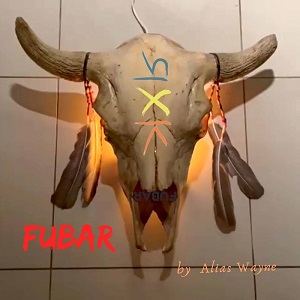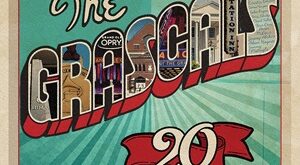Often as vulnerable in tone as any of the actual lyrics in the songs they’re featured in are, the strings we find in the new record from Ranzel X Kendrick, Alias Wayne’s Fubar, are a crucial element of communication that is inarguably at the foundation of every stitch of material presented in this four-song tracklist from the acclaimed singer/songwriter and experimentalist. From “Love One Another” to the driven “Window of My Soul,” patient near-instrumental “Eight Ball in the Corner Pocket” and sprawling “Father Song,” their compositional fabric is a quintessential component of our understanding the deeper narrative Kendrick is trying to convey beneath the layers of poeticisms and pastoral harmonies.
FACEBOOK: https://www.facebook.com/RanzelXKendrick/
The lyrics are a lot more enigmatic in Fubar than they have been in past affairs produced by this artist, but I wouldn’t go as far as to say that they make moving numbers like “Father Song” any less relatable (especially from an emotional point of view). “Eight Ball in the Corner Pocket” puts as much stock into its melodicism as it does its seemingly absent verse, and to be perfectly honest, I think that it surpasses the more lyrical songs here in terms of creative experimentalism because of its tremendous duality, and its deceptively simple structure.
Despite the stripped-down nature of the arrangements Fubar is boasting in its “Love One Another” and “Window of My Soul,” I think that both of these songs – and the EP as a whole – have a couple of profoundly cerebral moments that impact the feel of the music overall. I get the impression that Kendrick is wanting to explore his sonic depth a little more in this record, and although there’s a case to be made that he and his cast of players are taking much smaller steps than when they need to in this instance, I can also understand why he’d want to play it safe (after all, their contemporaries haven’t had the best results when it comes to this kind of experimentation).
Its high-definition production quality aside, the textural grit in “Father Song” speaks to the raw intensity that Alias Wayne is still bringing into the studio with him every time he decides to record new music, which is a lot more than I can say for about some of his closest rivals – especially in recent times. He isn’t varnishing over anything as much as he’s sanding down the angularities in his compositional style, which as I see it is something to be critically commended rather than discouraged.
Alias Wayne submits an intriguing, albeit frankly emotive indie offering in the fascinating Fubar that I have a feeling audiences are going to respond quite well to this spring season. As the wet months prepare to disappear in favor of the summer heat taking their place, I’ve found that there are a lot of artists – Kendrick included – touching on new ground with their work, perhaps in hopes of inspiring interest in an emergent era in music still yet to be heard. I’ll be paying attention to this man’s catalog from here on out, and after checking out Fubar, I think there is a good chance that you will likely be doing the same.
Mark Druery
 IndieShark Music News, Reviews & Interviews
IndieShark Music News, Reviews & Interviews



